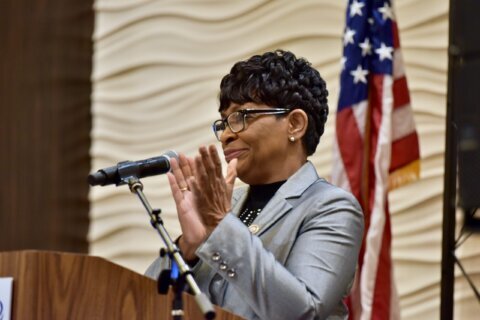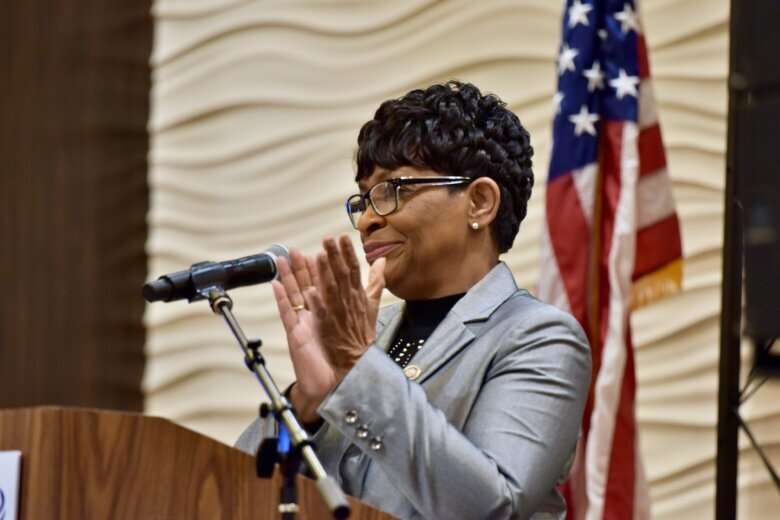This article was republished with permission from WTOP’s news partners at Maryland Matters. Sign up for Maryland Matters’ free email subscription today.

The “decency agenda” championed by House Speaker Adrienne A. Jones (D-Baltimore County), one of her main priorities for this year’s 90-day legislative session, was formally released Thursday.
While the bills that are part of the agenda have all been introduced in recent days, their common thread is being amplified with a video message that Jones released Thursday.
“To me, decency is about respect,” Jones said. “Respect for our communities, coworkers, friends and families. Unfortunately, over the past few years, that respect has been jeopardized by political disagreements that has literally pulled us apart.”
Five bills are part of the speaker’s decency agenda in the House of Delegates.
At the top of the agenda is House Bill 785 sponsored by Del. Dana Jones (D-Anne Arundel), which focuses on protecting controversial books and other diverse materials in libraries.
The package also includes anti-discrimination and anti-disinformation bills and a measure to provide training to school officials on anti-semitism and Islamophobia.
The library bill is part of a national conversation on what literary material is being made available in public libraries and school libraries.
The legislation, labeled the “Freedom to Read Act,” seeks to protect school and public library employees by stating they “may not be dismissed, suspended, disciplined, demoted, reassigned, transferred or otherwise retaliated against” for following state library standards that are laid out in the bill.
Some of the standards, according to the bill, would include not removing library materials, books and other resources based on an author or creator’s background, origin, or opinions. In addition, a library should not prohibit or remove materials from its catalogue “because of partisan or doctrinal disapproval.”
If any county library, resource center, or “cooperative service program” developed by the Maryland State Library Agency have policies that aren’t consistent with these state standards, then the state librarian would authorize the state comptroller to withhold state funding.
A person cannot “knowingly and” unlawfully take, disfigure, or ruin any book or other library property.
A person found accused of these offenses would be charged with a misdemeanor and, if found guilty, could spend up to 10 months in jail, pay a fine not exceeding $1,000, or both. The current fine is $250.
The bill is scheduled for a hearing before the House Ways and Means Committee on Feb. 21.
“If you don’t like a book, you don’t have to read it. And if it’s not right for your family, you don’t have to check it out for your child or your family,” Dana Jones, who’s worked on this legislation for nine months, said in an interview this week. “But you shouldn’t have the ability to take that book off the shelf for somebody who does want to read it [and] could learn from the lived experiences of those people in the book.”
House Minority Leader Jason C. Buckel (R-Allegany) signaled his discomfort with the legislation and said the key issue in the discussion is what’s “age-appropriate.”
“Public libraries are wonderful places. We need to have a wide variety of educational literature and materials in them,” said Buckel, who serves on the Ways and Means Committee. “But if 6-year-olds and 8-year-olds and 9-year-olds can easily access material that’s not written for them…I think that’s a problem.”
He continued: “I think it’s a problem to use taxpayer dollars to provide materials that most of us wouldn’t read [and] almost all of us wouldn’t read to our kids. That’s not a knock on the LGBTQ community. It has a place in public discourse for more mature children and adults, just as literature that probably is a little too mature in a heterosexual context. I wouldn’t support any of that being in schools.”
National movements
If the Democratic-controlled General Assembly approves the library legislation, Maryland would be one of the few states in the nation to approve a policy with strong protections for what can be found in libraries and penalties for those who attempt to thwart it.
Illinois became the first state in the nation last year to sign a similar policy into law, which went into effect Jan. 1.
Several other state legislatures, including Colorado, Kansas, New Jersey and New Mexico have seen anti-book banning legislation introduced this year.
To combat book banning efforts nationwide and celebrate Banned Books Week in October, PEN America, the literature and human rights organization, launched online training for students that included sessions with best-selling authors, activists and others.
The organization, which also advocates for the First Amendment, published a report which showed more than 3,300 books were banned in the U.S. during the 2022-23 school year, a 33% increase from the previous school year.
The report found the top five books banned in schools last school year were “Tricks,” “The Bluest Eye,” “Looking for Alaska,” “A Court of Mist and Fury” and “Gender Queer: A Memoir.”
Although the PEN America report notes Maryland was one of 16 states without book bans, there’s been some local resistance.
The Carroll County School Board unanimously approved a policy last month, which says in part that “all other instructional materials…shall not contain sexually explicit content. Sexually explicit content is defined as unambiguously describing, depicting, showing, or writing about sex or sex acts in a detailed or graphic manner.”
An email sent to Maryland Matters on Wednesday from a school board spokesperson showed a list of books that were removed from school library shelves and media resource centers along with others that were retained. One book in a second round of review titled “Sex is Funny Word” was recommended by a reconsideration committee to “retain” in the schools, but the superintendent chose to remove it.
Moms for Liberty, a conservative parental-rights group with about 300 chapters nationwide, has been one of the leaders pushing for stricter rules for school systems to select books in libraries.
According to the group’s website, 10 chapters have been established in Maryland, in Anne Arundel, Baltimore, Carroll, Cecil, Frederick, Harford, Howard, Montgomery, Talbot and Worcester counties.
Suzie Scott, chair of the Moms for Liberty’s Maryland Legislative Committee, called the Freedom to Read Act bill “very radical” and part of an agenda with the Maryland Library Association.
“The [Freedom to Read] Act is really a right to read inappropriate material,” said Scott, chair of the organization’s Harford County chapter. “It will allow the state to train librarians to keep inappropriate materials by reframing words like ‘diversity’ and ‘inclusion’…and have to have this material in our schools. Some of it is truly pornographic.”
Scott highlighted BookLooks.org as a resource that has reviewed thousands of books.
The site rated “Gender Queer: A Memoir,” one of the books PEN America noted as one of the nation’s most banned books in schools, with “4.” The number, according to Book Looks, equates to a book with adult content with “explicit, sexual nudity.”
Scott said if people want to purchase the books, or read them at a public library or online, that’s fine. However, she said books such as “Gender Queer” aren’t suitable for young people.
“I’m 100% opposed to any censorship. I love the Harford County Public Library. It is a wonderful system, but I do believe I have the right to protect my children and grandchildren from materials that are clearly inappropriate for minors,” she said. “Parents aren’t just being heard and our challenges are being met with this book banning label and we are homophobic. Not at all.”
Joshua Stone, executive director of the state Library Association, acknowledged there’s a “very small section of the community” trying to set an agenda for what materials should be on bookshelves.
According to 172 responses in a survey between Sept. 19 to Sept. 25 from the Maryland Association of School Librarians, about 52% of respondents avoided purchasing a book because they were afraid it may be controversial.
Last year in Carroll County, the state’s librarian association rallied before the school board in support of a librarian who reassigned as an English teacher, according to The Baltimore Banner.
That’s why Stone said the Freedom to Read Act is important, because it would allow library employees to do their jobs without fear of retribution.
“It will help libraries set their own standard and it gives the community actual avenues to be a part of that discussion without having one parent who decides that no children in that community should be able to read a book they disagree with,” he said. “It will let Maryland be a leader in the nation as far as protecting libraries, protecting library workers and protecting the freedom to read.”
Another Freedom to Read Act supporter is Sonia Alcántara-Antoine, the CEO of the Baltimore County Public Library. Alcántara-Antoine, who also serves as president of the Public Library Association that represents libraries in the U.S. and Canada, traveled this week to Cleveland to talk about 21st Century libraries.
“Libraries are welcoming, inclusive spaces that are there to serve their communities,” she said. “Our job is to provide access to materials, services and resources that reflect the diversity of our communities. It’s not appropriate for one person or one small minority within a community to basically determine what can be on the shelf at the library because they might disagree with it. Libraries do not prohibit or remove materials from our collections based on partisan or doctrinal disapproval.”
Remaining decency agenda
The four remaining bills on the decency agenda includes House Bill 333 sponsored by Del. Samuel I. Rosenberg (D-Baltimore). A hearing already took place Feb. 6 before the Ways and Means Committee.
The legislation would require each social media platform of more than one million monthly active users in the country “to make reasonable efforts to prevent, detect, and remove accounts and posts that communicate election disinformation in the state.”
The final three bills scheduled for hearings this month are:
- House Bill 602 – sponsored by Jones and co-sponsored by Del. Luke Clippinger (D-Baltimore), chair of the House Judiciary Committee. The bill, scheduled for a hearing Wednesday before the Economic Matters Committee, proposes to ensure employees do not discriminate against a person’s sexual orientation or gender identity.
- House Bill 1386 – sponsored by Del. Vanessa Atterbeary (D-Howard), chair of the Ways and Means Committee, would require each county and the city of Baltimore board of education for employees to receive annual training “on the prevention of antisemitism and islamophobia.” A hearing is scheduled before that committee Feb. 26.
- House Bill 1287 – sponsored by the speaker and co-sponsored by Atterbeary and Del. Jheanelle K. Wilkins (D-Montgomery), vice chair of the Ways and Means Committee and chair of the Legislative Black Caucus of Maryland. As part of rewarding a new contract, the legislation would require an incoming state superintendent and a local school superintendent must complete a school leadership course or program. A hearing on the bill is scheduled for Feb. 28 before the Ways and Means Committee.
“I want to be clear: I’m not trying to push my ideology on anyone else. I am not asking for Marylanders to believe in what I believe in, or compromise their values,” Speaker Jones said. “We know that we’ll never agree on everything, and we shouldn’t. But we need to be able to have disagreements without being disagreeable. We need to stop allowing our worse instinct to drive the conversation. I’m just asking us all to show a little bit more decency, a little bit more respect, and a little bit more patience for the beliefs and the identity of our fellow citizens.”








